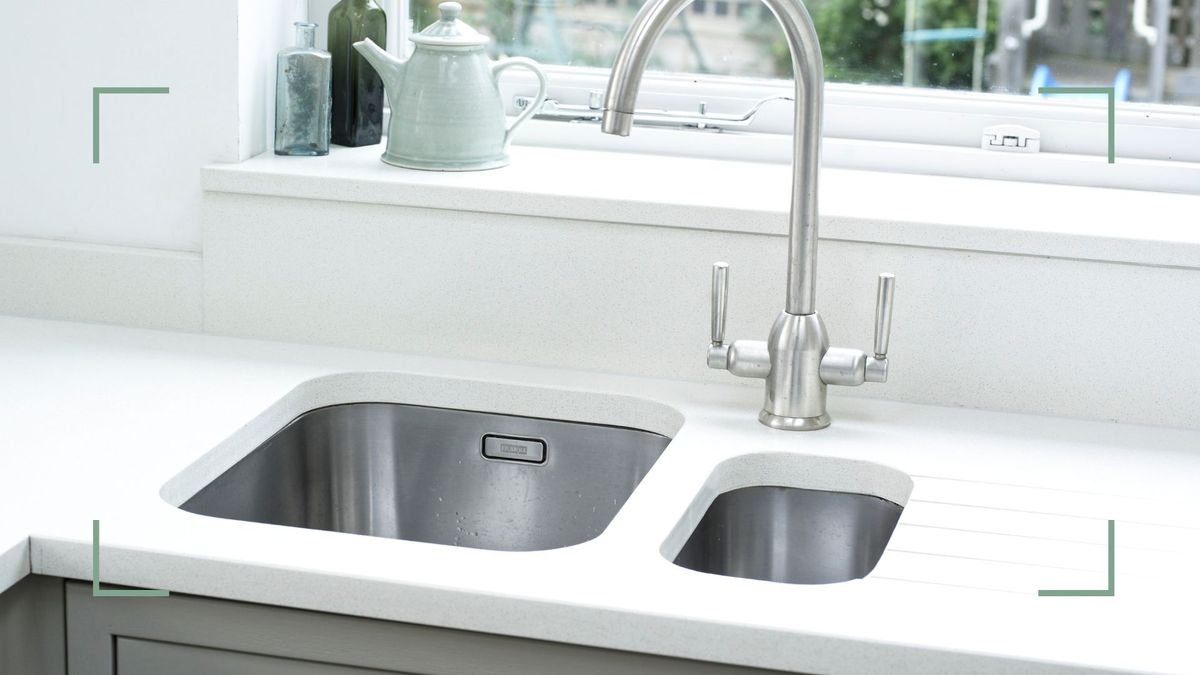
[ad_1]
Knowing how to clean a kitchen sink drain may not be glamorous but it will prevent potential problems with blockages and unwelcome odours.
The kitchen sink drain is an incredibly hardworking component of any home, constantly in use and often subject to unwanted things you should never pour down the kitchen sink – all of which can lead to blockages and bad smells arising.
“Cleaning your kitchen drain and sink regularly will prevent old food and grime from lingering and drifting throughout the rest of your home,” says Nigel Bearman, CEO of domestic and commercial cleaning company Daily Poppins.
“Therefore, it is important that you maintain the cleanliness of your kitchen sink and drain on a regular basis. Make them a habit by incorporating them into your weekly kitchen cleaning routine.
In order to do the task with such regularity we recommend trying this expert-approved method that doesn’t involve using harsh chemicals.
How to clean a kitchen sink drain without chemicals
The easiest and most effective way to clean kitchen sink drains without chemicals is to use organised pantry ingredients because cleaning with baking soda and cleaning with vinegar offers a natural way to through grease.
“Baking soda and vinegar make the perfect combination to target grime as baking soda contains a mild alkali that easily breaks down food and grease and white vinegar works to eradicate any remaining residue and odours,” explains Peter Clayton, an expert from Trade Plumbing.
To clean your kitchen sink drain naturally you will need the following:
- Dish soap/detergent
- Baking soda
- White vinegar
- A clean microfibre cloth
1. Pour dish detergent down the plughole
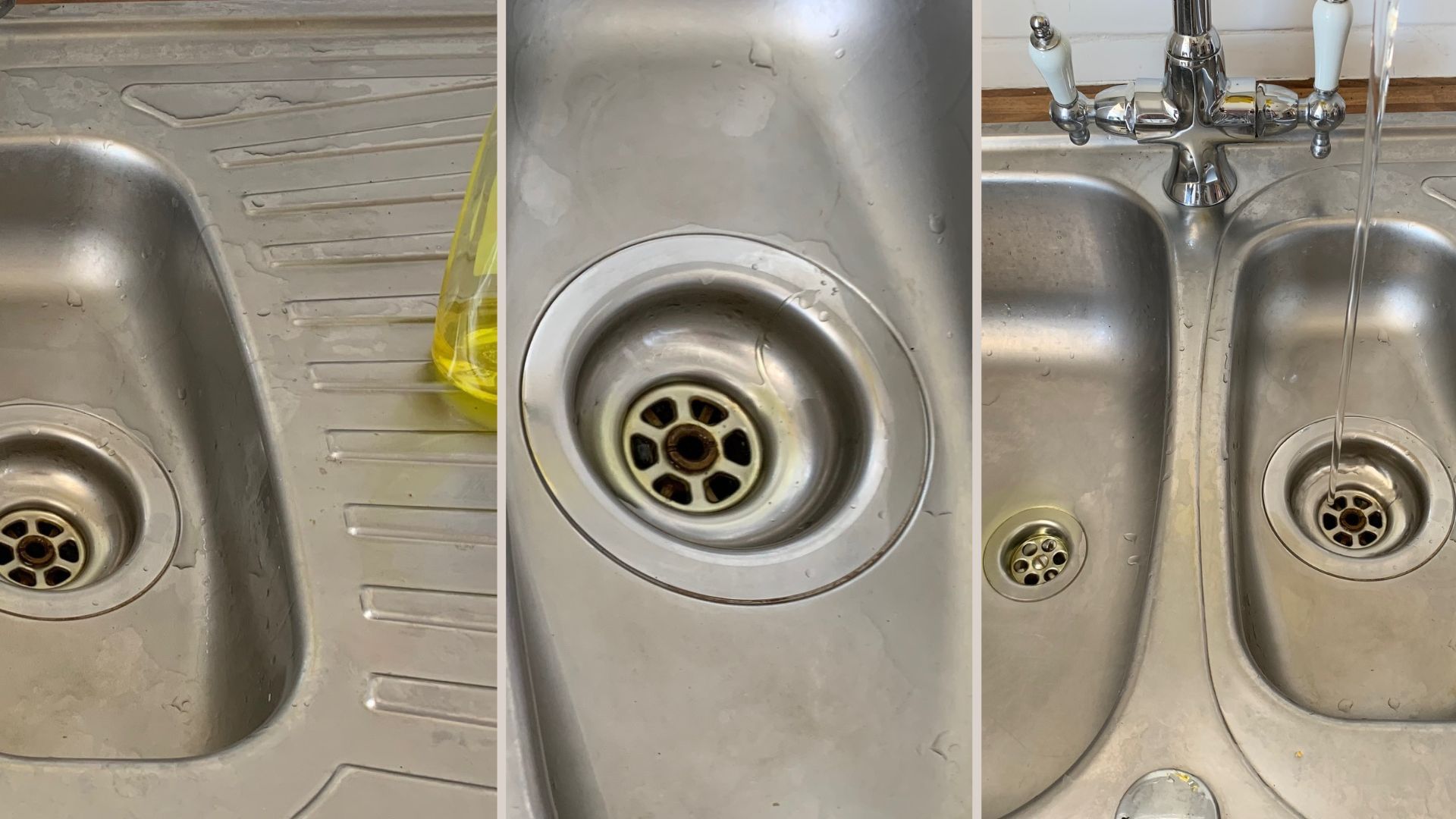
(Image credit: Future)
As a pre-clean step, it’s good to start by pouring dish soap down the kitchen sink drain to cut through the initial buildup. Leave it to settle for 5 minutes or so before combining it with running hot water to move things through the pipe.
The hot water helps dissolve some of the greases that restrict the pipes, and the dish detergent aids in removing any harder-set fats and oils.
2. Add the baking soda
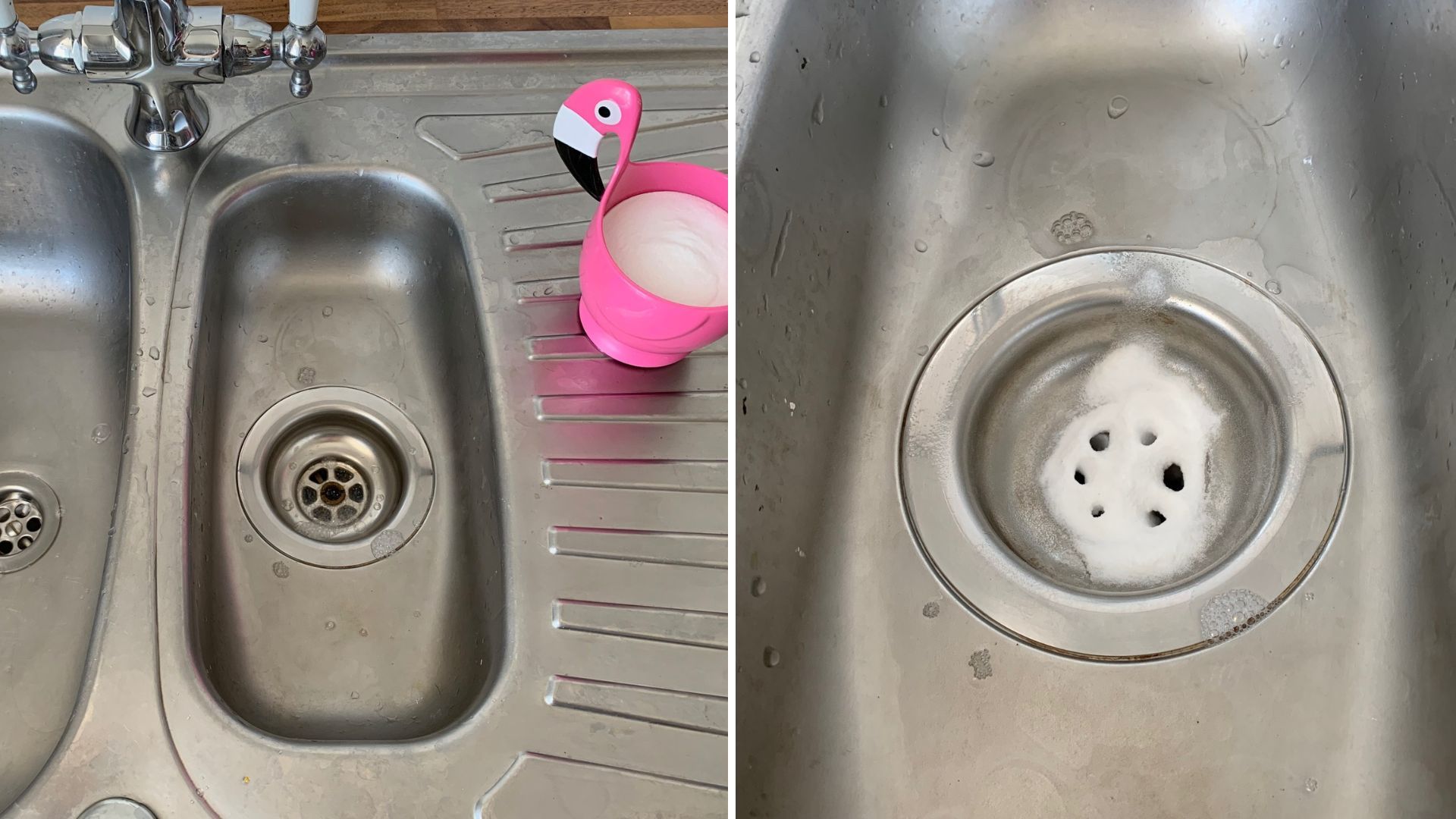
(Image credit: Future)
“Follow the first step by adding one cup of baking soda,” suggests Peter. Pour it directly down the drain via the plughole, trying to avoid spilling too much around the surface.
We used a measuring cup, a rather cute one we might add, to get the correct amount but roughly 200g is ideal if you have a double sink like this one.
Incidentally, you can also clean an oven with baking soda to get gleaming results, an ideal solution again for avoiding harsh chemicals in the kitchen.
3. Add white vinegar
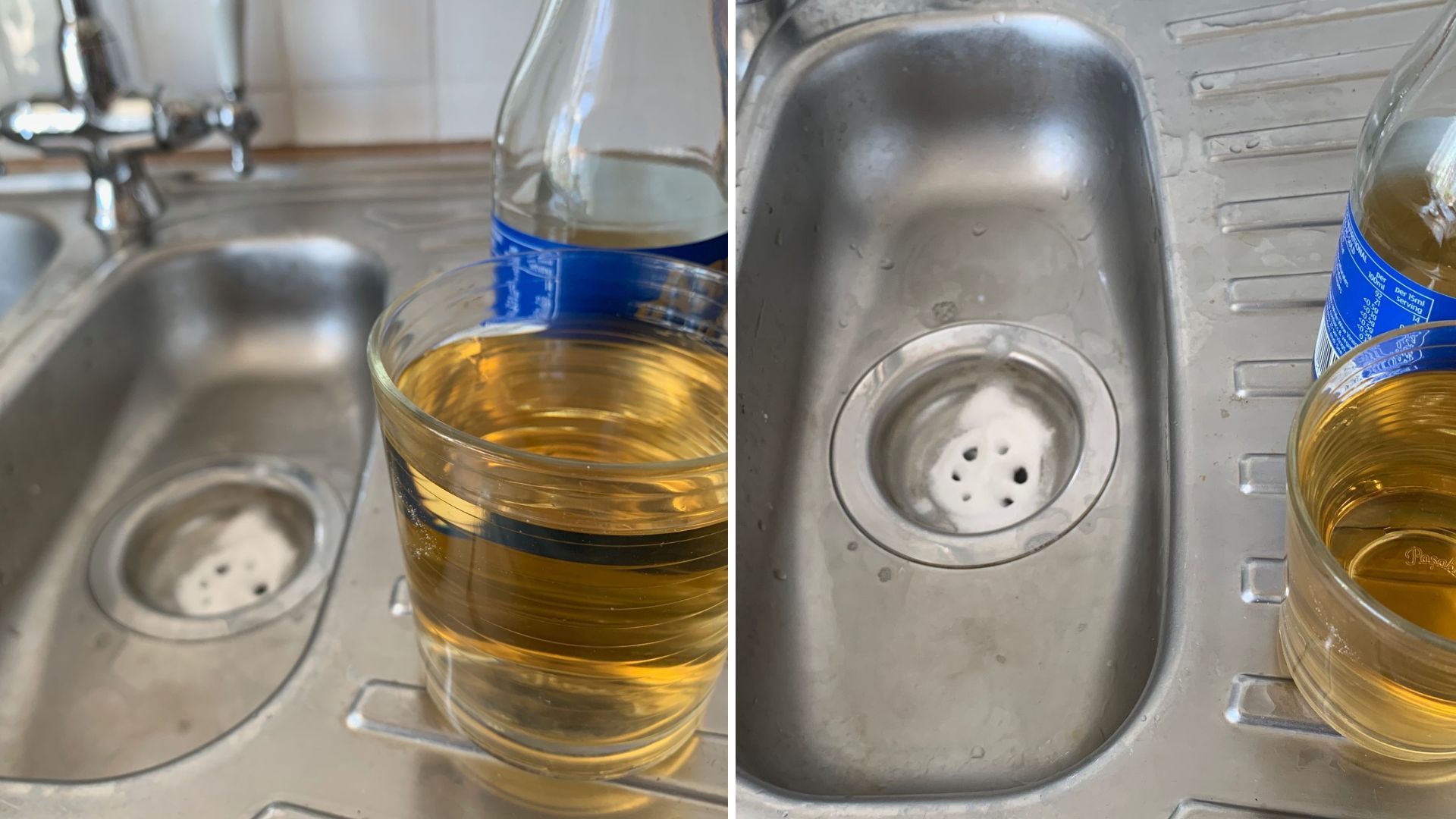
(Image credit: Future)
Next, it’s time to add a measured cup of white vinegar, approximately 250g. Pour the vinegar directly into the drain.
You will immediately begin to see foam rising from the plughole. Don’t panic this is perfectly normal, it is merely the chemical reaction that occurs when you combine baking soda and white vinegar.
You’ll be familiar with this reaction if you’ve ever used these two ingredients to clean the grout in your kitchen.
4. Cover with a microfibre cloth
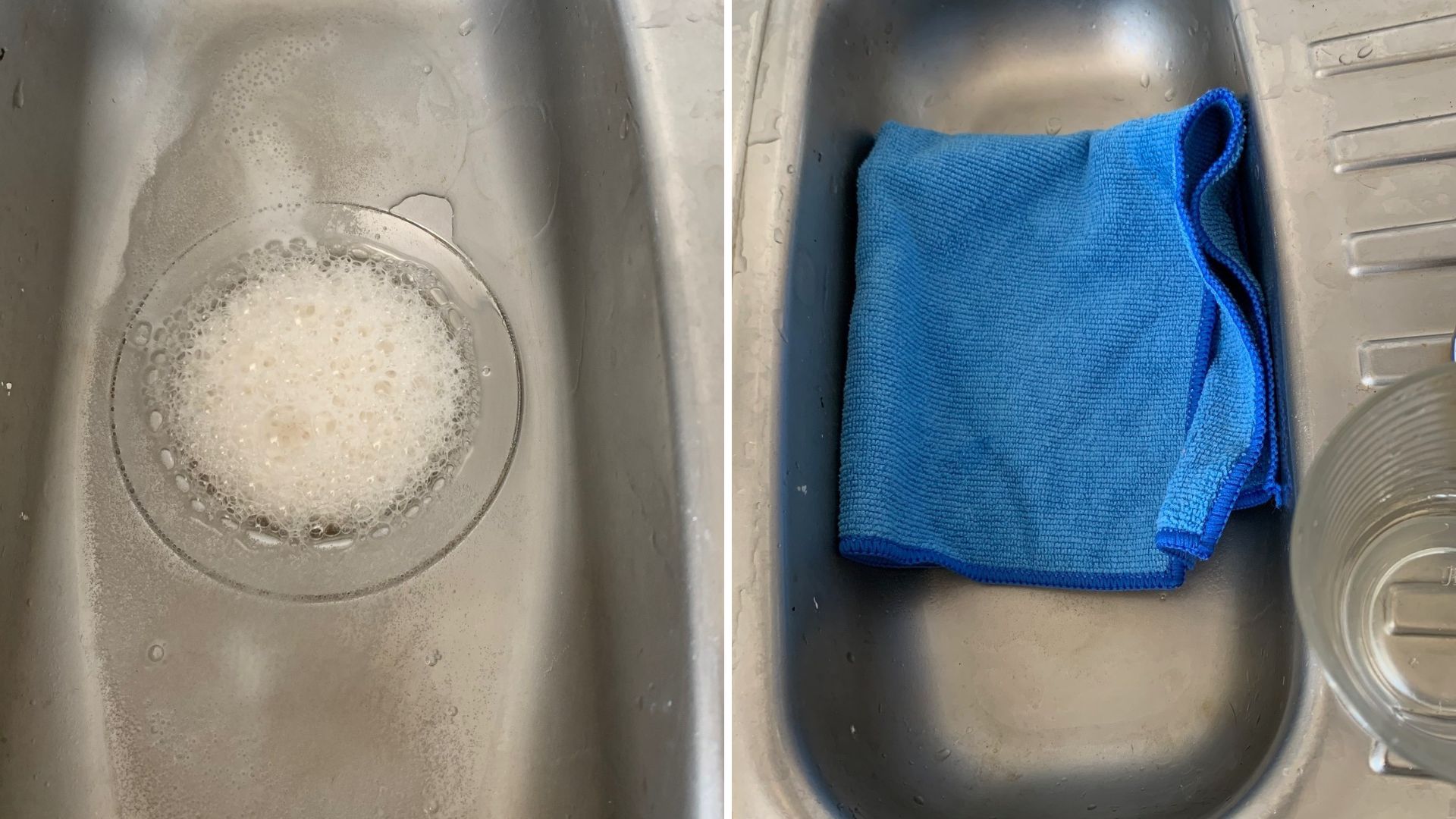
(Image credit: Future)
Once you have combined your natural cleaning ingredients it is time to let them work their magic.
Cover the drain and any surface foam that has resulted from combining your cleaning ingredients to prevent any more from escaping – you want the solution to stay in the drain rather than rise up.
“Leave for a further 10-15 minutes,” suggests Peter. You can leave the solution to work for longer but we wouldn’t recommend any longer than 30 mins ideally.
5. Rinse with warm water
Once you have allowed the cleaning solution to sit for the allotted time you can rinse to finish. “Flush the remaining residue with hot water from the tap and repeat the process as often as required,” adds Peter.
“It is important to note that if your pipes are plastic, using hot water throughout the steps is a better option as sometimes boiling water can misshape areas of the pipes.”
FAQ
What is the best thing to clean a kitchen sink drain with?
“When it comes to cleaning and unclogging drains and disposals, nothing works better than baking soda and vinegar,” says Nigel Bearman, CEO of domestic and commercial cleaning company Daily Poppins. “It is a very straightforward procedure. You may use an equal mixture of baking soda and vinegar to clean your drain holes and observe the results.”
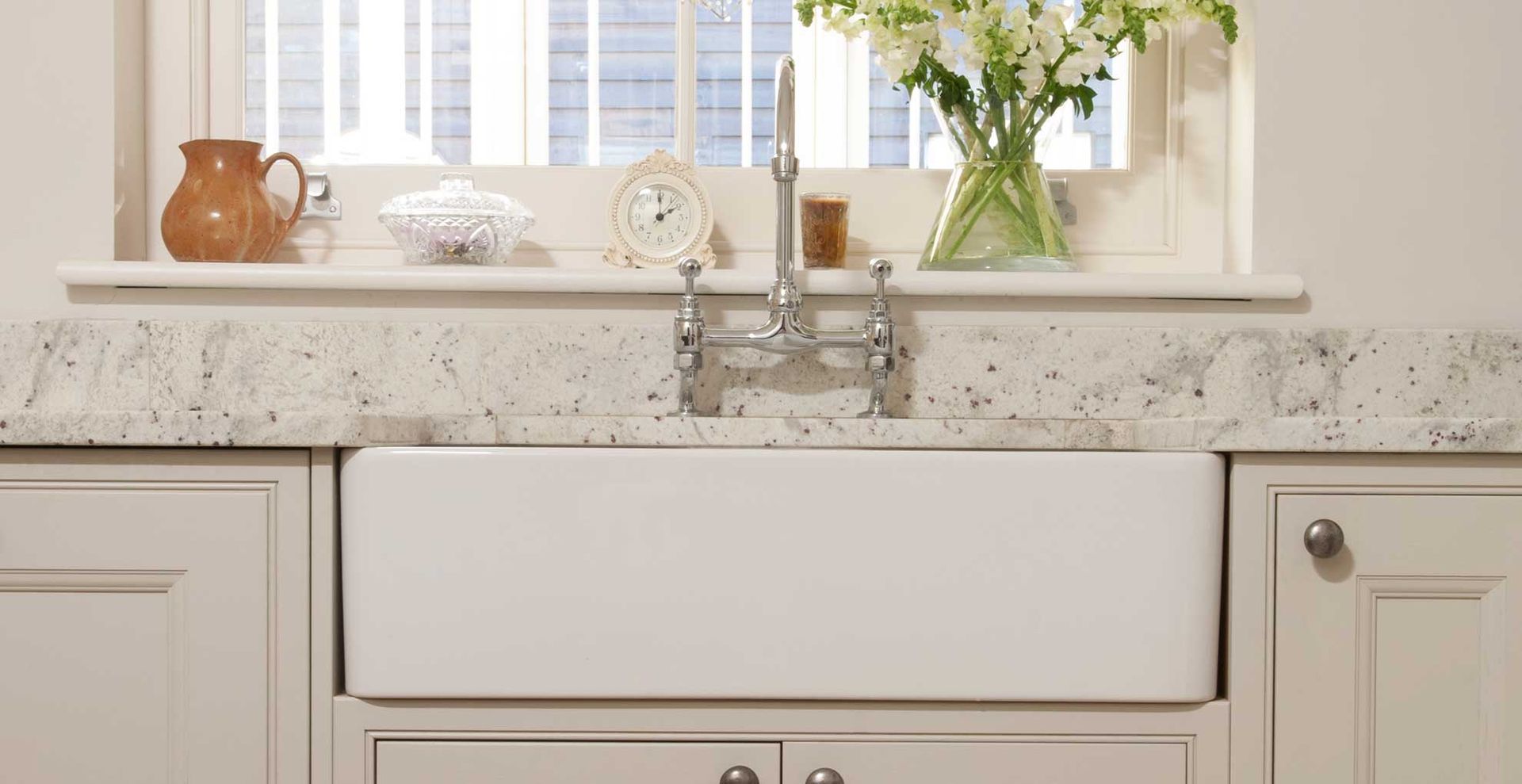
(Image credit: Future)
How do you deodorise a smelly kitchen drain?
Baking soda is the best way to deodorise a smelly kitchen drain, in fact, baking soda is the secret weapon of how to make your house smell good on a budget for deodorising and cleaning fridges and even kitchen bins.
Nothing ruins your efforts of scent-scaping your home more than the lingering smell of stagnant drains. The smell of ‘Eau de drains’ wafting through your home is very unpleasant, trust me because it’s a common problem I have – the result of living in a converted period property. Luckily I have mastered this simple cleaning technique using baking soda to tackle drain cleaning with ease to keep any potential smells at bay.
How do you clean a particularly greasy kitchen sink drain?
To clean a particularly greasy kitchen sink drain Peter advises: “Start by simply pouring boiling water down your kitchen drain, this will help to break down and dissolve any large lumps of grease.”
“Then wait 5 minutes and repeat with a mixture of one part hot tap water and one part vinegar. The acidity of the vinegar helps to easily cut through grease and diluting with water means this method isn’t overly corrosive so there’s no risk of damaging your drains.”
If this still doesn’t do the job sufficiently enough Nigel suggests trying salt and hot water. Explaining how this method works he says: “Hot water melts some of the grease that narrows the pipes. In addition to its abrasive texture, salt acts as a natural scouring agent, allowing more greasy deposits to be removed. By combining these two cleaners, buildup on drain pipes can be removed and the drain can flow more freely.”
How to use salt and water:
- Add one-half cup of salt to the drain that is slow to drain. You can Use any type of salt (table salt, sea salt, or kosher salt).
- Prepare 2 litres of water by heating it to nearly boiling point and then slowly pouring it down the drain.
- Rinse the drain with hot water. It may be necessary to repeat the salt and hot water process several times.
How do you remove sludge from a kitchen sink drain?
The only way to truly remove sludge from a kitchen sink drain is to flush it through the pipes, therefore you need to use baking soda and white vinegar to clean your kitchen sink drains effectively. Follow the cleaning steps above to remove any blockages and allow the ‘sludge’ aka food remains and other debris to pass more freely to avoid any potential gunky buildups.
[ad_2]
Source link






